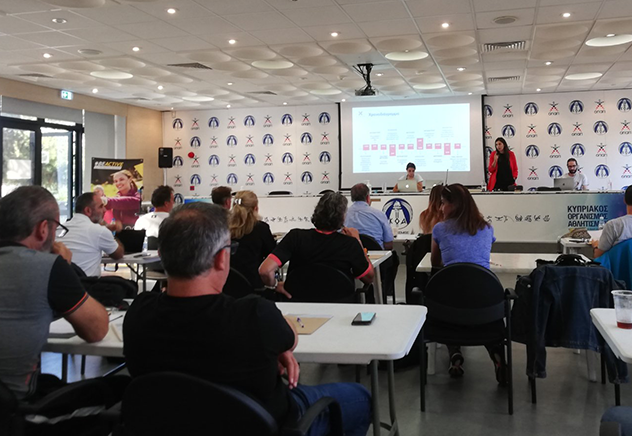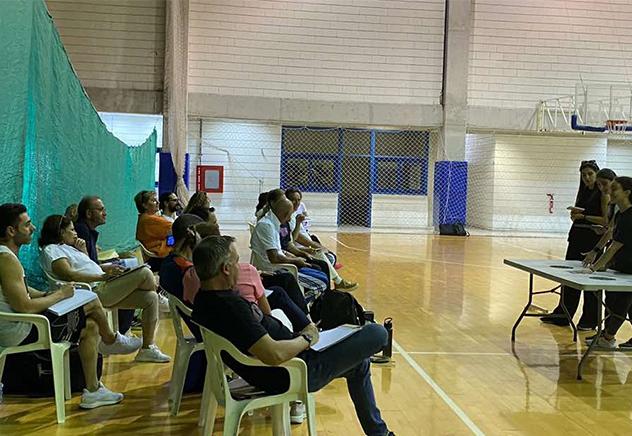
News
Collaboration with the Ministry of Education, Sports, and Youth to enhance physical condition and reduce obesity of high school students
October 18th, 2022
 Frederick University is implementing the "Aristotle - CyFIT" project in high schools, which is part of the National Physical Fitness Assessment Program for students. The project was commissioned by the Ministry of Education, Sports, and Youth with the aim of evaluating the physical condition of students in Cypriot secondary schools, with the ultimate goal of preventing and addressing childhood obesity.
Frederick University is implementing the "Aristotle - CyFIT" project in high schools, which is part of the National Physical Fitness Assessment Program for students. The project was commissioned by the Ministry of Education, Sports, and Youth with the aim of evaluating the physical condition of students in Cypriot secondary schools, with the ultimate goal of preventing and addressing childhood obesity.Frederick University secured scientific support through collaboration with experts from the School of Physical Education and Sport Science at Aristotle University of Thessaloniki, following an open European tendering process. Within the project, the University will develop a reliable database for the physical fitness level of Cypriot children, along with a connection to their dietary habits and levels of physical activity.
Three departments of Frederick University are collaborating on this project: the Department of Educational Sciences through the Physical Education and Sports Science Program, the Department of Electrical and Computer Engineering and Informatics through the Mobile Devices Laboratory (MDL), and the Department of Business Administration. MOEC is also involved in the project's implementation through the Directorate of Secondary General Education and the Physical Education Inspection Office.
The launch of the project's first pilot phase took place on Thursday, October 13, at the facilities of the Cyprus Sports Organization in Nicosia. 25 Physical Education teachers were trained by scientists from Frederick University's Physical Education and Sports Science Program. The theoretical part of the training for Physical Education teachers from seven secondary schools was held in the KOA's Events Hall, while the practical part took place at the Evangelos Florakis Multifunctional Sports Hall. After returning to school, the educators will measure and evaluate the physical condition of their students. Their assessments, in the form of data, will be collected and recorded on a special electronic platform developed by the Mobile Devices Laboratory (MDL) of Frederick University. Furthermore, the Department of Business Administration will process the results to create user-friendly standards for each parameter of physical fitness.
The Aristotle - CyFIT project allows, for the first time, the comparison of the physical condition of Cypriot students aged 12-18 with students of the same age from other European countries. This includes comparing similar fitness programs, dietary habits, and levels of physical activity, and comparing with other international data. Additionally, the assessment of the data will lead to the development of individual and national interventions to reduce obesity.
"The issue of obesity in Cyprus, especially among children and adolescents, is a problem of critical proportions and is directly linked to two factors: poor diet and lack of exercise and physical activity," comments Dr. Elena Papakosta, Associate Professor of Ergophysiology and coordinator of Frederick University's Physical Education and Sports Science Program. "This project reflects our belief that a healthier world requires active people. We need to ensure that everyone has access to a variety of physical activity opportunities in their daily lives, promote fitness, and create better conditions for a healthier, high-quality lifestyle."
It should be noted that the electronic platform to be developed will be easily accessible to students and parents. They will be able to view their child's individual performance, set and monitor their goals, and receive advice for improving their physical fitness. Physical Education teachers will also have access, while national agencies and citizens will be informed about interventions to promote physical activity and reduce obesity.
After the first data collection cycle, which will take place in October and November for the pilot phase, the first scientific analysis of the results is expected in early 2023. The project will be gradually implemented in all schools and among all secondary school students in Cyprus.


